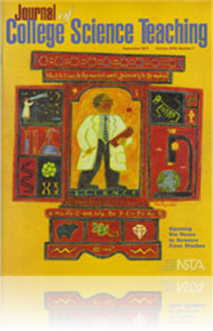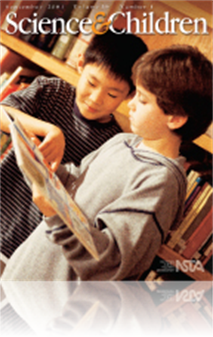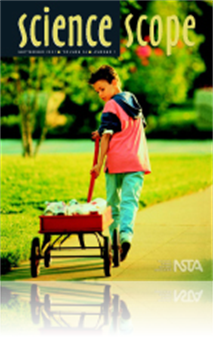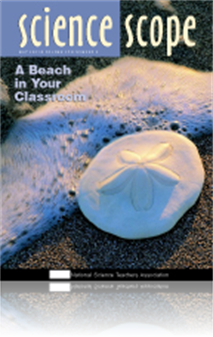All Resources
Journal Article
The Moon Also Rises: Investigating celestial motion models
Investigating celestial motion models is the focus of this Earth-Moon-Sun (EMS) astronomy unit. The model involves relevant motions of these objects that can be used to explain Earth-based astronomical phenomena—day and night, sunrise and sunset, m...
Journal Article
This case explores the fundamental principles of memory, eyewitness accuracy, and police questioning techniques in witness identification in a criminal case. Studying the details of an actual series of attacks and subsequent police investigation, stu...
Journal Article
This case uses the story of Dawn Langley Simmons, who may have been misidentified as male at birth, to illustrate the developmental basis of human sexual dimorphism and how gender misidentification may occur: Students also consider the emotional, leg...
Journal Article
The recent discovery of a mammoth frozen in the Siberian tundra is the backdrop for this case study, which explores the various theories for the extinction of the great Ice Age mammals and Homo neanderthalensis. Students research evidence for and aga...
Journal Article
The Idea Bank provides tips and techniques for creative teaching, in about 1,000 words. This month’s Idea Bank features the Science in Fiction project where students write an essay comparing and contrastng a science fiction book with a correspondin...
Journal Article
In this case study, students grapple with the complex issues surrounding the use of DDT to control malaria, which affects millions of people in developing nations. In their examination of the issues, students consider risk/benefit analysis and the pr...
Journal Article
The Building Blocks of Geology
Elementary level students often have difficulty grasping the difference between minerals and rocks. Because minerals and rocks are basic to the understanding and study of Earth science, knowledge of their characteristics and relationships is critical...
Journal Article
The Idea Bank provides tips and techniques for creative teaching, in about 1,000 words. In this month’s Idea Bank, students begin the physics class by studying the behavior of light. In this activity, the teacher pretends to be a member of the blin...
Journal Article
Spring Break: A Lesson in Circuits
This case, taught in a problem-based learning format, introduces students to the topics of electricity and circuits within the context of house wiring. Students explore the properties of series and parallel circuits, research local wiring codes, calc...
Journal Article
Assessing Student Participation in the Classroom
We know that students should participate constructively in the classroom. In fact, most of us probably agree that a significant portion of a student’s grade should come from his or her participation. However, like many teachers, you may find it dif...
Journal Article
The Tokaimura Nuclear Accident
The 1999 accident at the Tokaimura nuclear fuel processing plant near Tokyo is the context for a student discussion on nuclear power and the consequences of a nuclear accident. The case covers issues ranging from chemical process safety to risk manag...
Journal Article
Editor's Note (September 2001)
Science and Children’s editor shares thoughts regarding the current issue....
Journal Article
Concrete Inquiry: An introduction to materials science
Students walk to school on concrete sidewalks every day. Yet how many of them understand how concrete is made, how it can be strengthened, or the difference between cement and concrete? In this materials science unit, students design and test a sampl...
Journal Article
Learning by Heart: Students use heart rate patterns to identify nervous system imbalances
In this article, students use computer-based sensors to detect beat-to-beat variations in heart rate, known as heart rate variability (HRV). HRV analysis is a rapidly evolving field of study, with connections to biology, health, mathematics, and musi...
Journal Article
This case is based on the experience of 50 children who were displaced during Argentina’s “dirty war” of the 1970s, underwent DNA and protein analysis, and subsequently were reunited with their biological families. Students consider not only th...
Journal Article
Sonic Hedgehog: A Good Gene Gone Bad?
In this case of a baby born with the genetic condition holoprosencephaly, students explore the “Sonic hedgehog” gene, signal transduction, and the ethics of body and tissue donation. The two-part assignment involves students writing an informed c...
Journal Article
Commentary: Together, Learning Science and the Science of Learning
An opinion piece about professional development and what we want to accomplish through professional development....
Journal Article
The Idea Bank provides tips and techniques for creative teaching, in about 1,000 words. In this month’s Idea Bank, the activity shows students that mitosis is a cycle....
Journal Article
Scope on the Skies: A busy school year for spacecraft
This column focuses on astronomy throughout the year. In this month’s issue learn about the busy year for spacecraft as well....
Journal Article
In this case, students enter the world of a forensic anthropologist who must determine the sex and age of an individual from a collection of bones. Students, in turn, simulate some of the actual procedures conducted in a forensic anthropologist’s l...
Journal Article
This case study tackles a tricky problem in probability based on the well-known carnival game Chuck-a-Luck, which, at first glance, appears to favor the bettor. Students must first correct a common fallacy in probabilistic reasoning and then extend p...
Journal Article
Many of our nation’s health concerns affect our students in a personal way. For example, there are over 750,000 new cases of diabetes mellitus every year; chances are that some of your students have family members with diabetes. Why not examine the...
Journal Article
The relationship of science to personal health becomes a relevant issue to middle school students. Nutrition plays an important role in physical health, and proper nutrition includes the intake of adequate amounts of drinkable water. This article pro...
Journal Article
Why do some inventions stand the test of time, while others disappear from the market entirely? In the activity described here, students work in groups of four to research pre-1950s inventions they see at antique/collectible stores, garage sales, and...
Journal Article
Storybook Science: Learning chemistry through science literature and technology
In this article, a high school teacher did not know how to help students read better to understand science and an elementary teacher wanted students to have technology experience. Together, they created and launched a joint project called, "Learning ...
Journal Article
Researching Radon: Students use GIS technology to analyze radon levels in Italian communities
United States students whose parents serve at Avianto Air Base in Avianto, Italy, live in many different villages in this region of northern Italy. Due to the varied geological conditions in which students live, a wide range of radon levels exists in...
Journal Article
River Walk: A community-oriented nature project
In this activity, the Tongue River is a natural teaching focus because the school is named for the river and everyone crosses over it to get to school. During the addition of a town park on the banks of the river, students helped build trails and sin...









